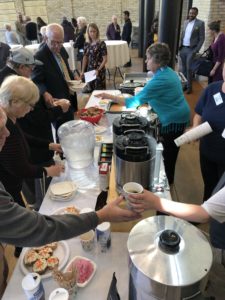COLLEEN JURKIEWICZ
CATHOLIC HERALD STAFF
It’s the first rule of physics: an object remains in a uniform state of motion unless that state is changed  by an external force.
by an external force.
For many Christians, that external force is mission work.
“You don’t know what your reality is until you’ve been out of it,” said Dr. Eric Boos, who gave the keynote presentation at the Archdiocese of Milwaukee’s celebration of World Mission Sunday on Oct. 20.
Dr. Boos’ presentation was entitled “The Synod on the (Destruction of the) Amazonian Region: What’s the Catholic Church’s Beef?” and focused on the ways in which Pope Francis’ 2015 encyclical Laudato Si challenges Catholics to involve themselves in matters of environmental concern.
Laudato Si, as Dr. Boos mentioned, is something of a “starting point” for the ongoing Amazon synod. “What’s going on in the Amazon is the culmination of all the environmental problems on the planet. We can’t look at the synod in South America and detach ourselves for one second and think — that’s South America, that’s the Amazon, doesn’t really connect to us,” he said. “Nothing could be further from the truth … the reason the Amazon is on fire right now, the reason that 80 percent of this deforestation is even occurring is so that you and I can have cheap beef.”
Laudato Si invokes the principle of subsidiarity, condemns rampant materialism and the rise of a self-centered, self-indulgent culture that looks only to the desires of the privileged few, not the needs of the vulnerable masses.
“The mindset which leaves no room for sincere concern for the environment is the same mindset which lacks concern for the inclusion of the most vulnerable members of society,” wrote Pope Francis in Laudato Si.
“Laudato Si is not a feel-good book; it’s a challenge,” said Dr. Boos.
But to despair, said Dr. Boos, would be sinful, even in the face of gloomy statistics and expert predictions. We cannot be without hope in the struggle for environmental justice, even if the problems seem insurmountable and our own contributions miniscule. “As Catholics, you are not allowed … to say to God, ‘This can’t be fixed, we’re done, let nature take its course, we don’t have to try.’ Isn’t that despair? Isn’t that a sin against the Holy Spirit? There’s no problem too big for God.”
Therefore, said Dr. Boos, crucial to Catholic social teaching are issues of environmental consciousness, water scarcity and abuse, food justice and economic policies that support unequal allotment of natural resources. The role of the Catholic laity is crucial in this instance, he said, quoting Archbishop Jerome E. Listecki: “It is the work of the laity to translate this message into concrete economic, political and social policies.”
According to the logic of Laudato Si, the average Catholic cannot simply blame politicians for environmental issues, said Dr. Boos. The onus is on the faithful to do their own research and to make ethical decisions about their own environmental impact — whether that means limiting time in the shower, changing up their food purchases or simply skipping meat once a week.
“We don’t only vote in elections — we vote at the checkout,” he said. “The state of Wisconsin has more organic farmers per capita than any state in the United States. But we’re not running to them like we should be. If we would support them more directly, they would flourish and we could break the stranglehold corporate agriculture has on our economy.”
His own missionary involvement is something that opened his eyes to the reality of these issues, he said. Dr. Boos is a human rights lawyer and co-founder of Zeru Zeru Simama Sasa, an organization that advocates for and protects albinos living in Tanzania. He and his family, parishioners at St. Thomas Aquinas Parish, have made many visits to Tanzania over the past 25 years. They also used to run a 40-acre organic farm outside of Elkhart Lake for 10 years.
In addition to Dr. Boos’ remarks, the celebration also featured mission displays from local twinning parishes and nonprofits throughout the archdiocese, with a “Soup and Sip” meal of international coffees and homemade soups.
These missions and the people who participate in them are reason to hope that change is possible, said Dr. Boos.
“Thank God we have this forum — thank God we have so many people reaching out and practicing the New Evangelization. Why? Because we’re fixing things in other places? No. I’ve been working in Tanzania for 25 years; I don’t know if I’ve fixed anything,” he said. “But what does happen when we reach out and follow our call to evangelize is that we change. The real impact … is how it impacts us when we come back to the United States.”
